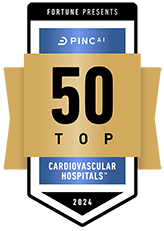Heart disease is the number one cause of death for men and women in the U.S., according to the Centers for Disease Control and Prevention. About 655,000 Americans die every year from heart disease, which can be inherited or developed from unhealthy habits. The American Heart Association (AHA) has identified risk factors that are most commonly found in people who have cardiovascular disease. These factors can be divided into controllable risk factors that can be prevented and uncontrollable risk factors.
Controllable Risk Factors for Heart Disease
Smoking
Smoking is a major risk factor for developing coronary artery disease and other atherosclerosis (hardening of the arteries) that can lead to death. Cigarette smoking also acts with other risk factors to greatly increase your risk for cardiovascular disease.
Smoking negatively affects nearly every organ. Quitting smoking prevents cardiovascular disease, heart attacks, stroke and death. It is never too late to quit and add extra years and quality to your life. Learn more about smoking cessation.
High blood pressure
Blood pressure refers to how hard your blood presses on the inside lining of your arteries as it travels through the body. The harder the blood presses against the vessel walls, the more likely the vessels will thicken, become blocked, burst or sustain other life-threatening damage.
Many Americans have high blood pressure, or hypertension, and don't even know it. Often, there are no obvious symptoms. That is why regular medical checkups and blood pressure screenings are so important to help detect this disease. Here are blood pressure level ranges, according to new blood pressure guidelines issued in 2017.
Regular exercise and a healthy diet are important factors in managing your blood pressure. Research done by the American College of Cardiology and the American Heart Association have shown that the best diets to reduce cardiovascular risk are the DASH (Dietary Approaches to Stop Hypertension), Mediterranean, plant-based and AHA diets.
High cholesterol
Cholesterol is a fatty substance produced by your body and found in many of the foods you eat. It is needed for normal body functions, such as cell wall protection, nerve impulse transmission and hormone production. However, high levels of cholesterol are associated with a greater risk of developing atherosclerosis.
Two specific kinds of blood cholesterol are low-density lipoproteins (LDL) and high density lipoproteins (HDL). LDL-cholesterol, sometimes called "bad" cholesterol, causes the cholesterol to build up in the walls of your arteries. Thus, the more LDL you have in your blood, the greater your risk for cardiovascular disease. In contrast, HDL-cholesterol, sometimes called "good" cholesterol, helps your body get rid of the cholesterol in your blood.
It is important that you regularly undergo a cholesterol screening to make sure your cholesterol level is healthy. Avoiding foods high in trans fats and saturated fats, like baked goods, fried foods and red meat, can help keep your cholesterol levels under control. You should eat meats that are lean animal proteins such as turkey, chicken or oily fish (such as salmon or mackerel) — increasing the good cholestrerol and reducing the bad. When lifestyle changes are not enough, physicians may prescribe medications called statins to lower cholesterol.
Lack of exercise
Exercise causes conditioning of the heart and skeletal muscle. The heart muscle in a well-conditioned person does not have to work as hard to circulate blood and nourish the body. People who lead inactive lives have a greater risk for developing cardiovascular disease and other risk factors such as obesity, high blood pressure and high cholesterol.
The Department of Health and Human Services recommends at least 150 minutes (2.5 hours) of moderate aerobic activity or 75 minutes of vigorous aerobic activity per week for adults. Brisk walking, jogging and swimming are examples of activities that can get your heart rate up.
Running and walking are great, but some movement is better than no movement. Activities like gardening and working around the house can count toward these activity minutes too, particularly for those people who are unable to walk or run for various reasons.
Obesity
Obesity results from the excessive accumulation of fat that exceeds the body's skeletal and physical standards. An increase in 20 percent or more of your ideal body weight is the point at which excess weight becomes a health risk. With obesity, the heart must work harder to nourish the extra tissue with blood. Extra pounds mean extra work for your heart. Heavier individuals are also more prone to sleep apnea, atherosclerosis, thromboembolic and metabolic diseases, such as dyslipidemia and diabetes.
Body Mass Index, or BMI, is a screening tool used to determine if you are in a healthy weight range. Calculate your BMI.
Diabetes
Diabetes, or sugar in the blood, occurs when either the body is unable to produce enough of the hormone called insulin or is unable to use the available insulin effectively. When the body lacks insulin, sugar and starches cannot be used properly for energy, causing excess sugar to build up in the blood.
If left uncontrolled, diabetes may have long-term effects on the kidneys, eyes, brain, heart and the nervous system. More specifically, heart circulation can be impaired — accelerating the process of atherosclerosis.
Diet is a big factor in blood sugar management. Limit sugary foods and beverages because they make your glycemic index worse — putting you at greater risk for becoming diabetic and increasing your risk for cardiovascular disease.
Preventive care and knowing your health numbers are key for controlling cardiovascular disease risk factors. It is important that you see a primary care physician for annual check-ups and monitoring of blood pressure, cholesterol and other risk factors. Find a Froedtert & MCW primary care physician.
Uncontrollable Risk Factors for Heart Disease
Heredity
One can inherit the tendency towards having cardiovascular disease. If you have close relatives who have had cardiovascular disease, especially if it was before the age of 50, your chances of developing a cardiovascular disease increases. Even though you may inherit the tendency toward cardiovascular disease, you can help prevent or delay it by controlling your risk factors.
Age
The older you become, the more likely you are to develop cardiovascular disease.
Heart and Vascular Screenings
We can test for the presence of cardiovascular disease before symptoms occur and you need more advanced treatment. We offer screenings to test for:
- Coronary artery disease
- Peripheral artery disease
- Carotid artery disease
- Abdominal aortic aneurysm
Our Cardiovascular Program continues to receive recognition as one of the top programs nationally. We are honored to provide high-quality, effective care for even the most high-risk patients.
-
Check Out Our Heart and Vascular Program Awards and Recognition
In its 2024 Specialty Excellence Awards, Healthgrades recognized Froedtert Hospital as one of America’s 50 Best Hospitals for Cardiac Surgery, one of America’s 100 Best Hospitals for Cardiac Care and one of America’s 100 Best Hospitals for Coronary Intervention, as well as other specialty achievements in various areas.

For the second year in a row, Froedtert Hospital was identified as one of the nation’s 50 Top Cardiovascular Hospitals™ according to an independent quality analysis based on a balanced scorecard provided by PINC AI™, and reported by Fortune. The hospitals recognized in the top 50 operated at lower cost and had better outcomes, recording significantly higher inpatient survival rates, fewer patients with complications, lower readmission rates and up to nearly $10,000 less in total costs per patient case. According to the study’s analysis, if all hospitals operated at the level of this year’s top performers, there could be 7,600 fewer deaths due to heart disease, 6,700 fewer bypass and angioplasty patients who suffer complications, and more than $1 billion in costs saved for the 2024 study year. Froedtert Hospital was ranked in the category of top teaching hospitals with a cardiovascular residency program. In this cohort of hospitals, Froedtert Hospital was ranked No. 4 in the country. No other hospital in Wisconsin was recognized with this national distinction.
The Society for Vascular Surgery's Vascular Quality Initiative (SVS VQI) has awarded Froedtert Hospital three out of three stars for its active participation in the Registry Participation Program. The mission of the SVS VQI is to improve patient safety and the quality of vascular care delivery by providing web-based collection, aggregation and analysis of clinical data submitted in registry format for all patients undergoing specific vascular treatments. The VQI operates 14 vascular registries.
The American Heart Association recognized Froedtert Hospital with its Get With the Guidelines® Heart Failure Gold Plus Award. In addition, the hospital was recognized on the AHA’s Target: Heart Failure(SM) Honor Roll and received the AHA’s Target: Type 2 Diabetes Honor Roll™ award.
The American Heart Association also recognized Froedtert Hospital with its Get With the Guidelines® — Coronary Artery Disease Mission: Lifeline STEMI Receiving Silver Plus and Mission: Lifeline NSTEMI Silver awards. These awards demonstrate our commitment to improving care by adhering to the latest treatment guidelines and streamlining processes to ensure timely and proper care for heart attacks.
The American Heart Association recognized Froedtert Hospital with its Get With the Guidelines® AFib Gold Award.
The Cardiovascular Intensive Care Unit (CVICU) and Neurosurgical Intensive Care Unit (NICU) at Froedtert Hospital have each received a silver-level Beacon Award for Excellence from the American Association of Critical-Care Nurses. This award recognizes unit caregivers who successfully improve patient outcomes and align practices with AACN’s six Healthy Work Environment Standards. Receiving this national three-year award with gold, silver and bronze designations, marks a significant milestone on the path to exceptional patient care and achieving a healthy work environment.





